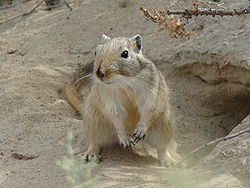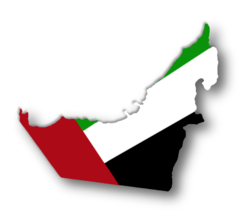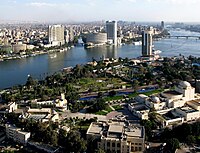Gosh, the UAE is 43! The UAE celebrates its 43rd National Day tomorrow, the 2nd December 2014, marking independence from Great Britain and the foundation of the Federation of seven emirates.
As always, the streets will be filled with hooning, happy people parading to celebrate their nation, not a sight you tend to see much of here in the Middle East, generally considered to be something of a tough neighbourhood.
It occasionally strikes me as odd to live in a country that's younger than I am. I'm also struck now and then to find people saying things like this place has got no history or culture, which is clearly twaddle - it has an unbelievably rich heritage which is rarely less than fascinating.
Here are ten geeky things you probably didn't know about the place.
Fujairah was the last emirate to become a Trucial State.
The UAE was founded out of the Trucial States, a number of sheikhdoms (emirates) on the east coast of the Persian Gulf which signed treaties with the British (Hence ‘trucial’) who in turn recognised them as sovereign powers. The last of these emirates to be so recognised was Fujairah, which only became a Trucial State in 1952 because British oil company Petroleum Concessions Limited (PCL) needed someone to sign a concession with.
That same year, the independent emirate of Kalba (recognised as a Trucial State by the British in 1936 as they wanted to build a back-up airstrip for the new Imperial Airways route that stopped overnight at Sharjah) became part of Sharjah. But for that, there’d be eight emirates today.
Mind you, small child Louis from Sarah’s class at Sharjah English a couple of years back had the solution to that one. “I know an eighth emirate!” he announced to the class when Sarah had named the seven emirates.
Mystified, Sarah asked him which Emirate that would be?
MALL of the Emirates! He piped, triumphantly.
Fair enough, actually…
Nahwa is a small Sharjah mountain village in Oman in the UAE. Whaaaat?
This exclave of Sharjah is actually nestled in an exclave of Oman called Madha which is itself entirely within the UAE, bordered by Sharjah, Ras Al Khaimah and Fujairah.
Another example of exclave madness is Hatta - to get to Dubai exclave Hatta from the city of Dubai by road, you have to pass through Sharjah, Oman and Ajman!
It’s all because the UAE’s boundaries were set in 1971 based on a survey by the British Political Resident in the late 1950s and early 1960s, Julian Walker, who spent five years asking local tribal leaders which territory they considered to be theirs and which Sheikh they recognised as ruler and then drawing nice, comforting British lines on a map. The report he compiled stretches to over 4,000 pages. And it’s pretty much what we have as the UAE today, including mad doughnut-shaped exclaves.
Abu Dhabi phone numbers start with 02, Al Ain with 03 and Dubai with 04 but there’s no UAE 01 telephone code in use today.
That’s probably because the original constitution of the UAE forged in 1971 envisaged the creation of a new capital city to be called ‘Karama’, to be built between Dubai and Abu Dhabi. The +971 code was originally issued in 1967 to cover the ‘Trucial States’ and so the 971 being the last three figures of the year of independence was just a coincidence. Dooodeedooodooo Dooodeedooodooo. For a time from the late 1970s to the early 1980s, Dubai and Abu Dhabi were actually assigned their own individual international calling codes, +978 and +979 respectively.
It all took just a handshake…
The creation of the UAE was famously made possible by a handshake between Sheikh Zayed bin Sultan Al Nahyan of Abu Dhabi and Sheikh Rashid bin Saeed Al Maktoum of Dubai, which took place on 18 February 1968 at the little village of Semeih on the Dubai/Abu Dhabi highway.
Except it didn’t: the roadside location was felt to be too noisy (even though it was little more than a desert track at the time) and the two rulers decamped to ‘Argoub El Sedirah’, a hill on the (rather fuzzy) border between the two emirates, now a few minutes’ drive south of Jebel Ali.
As the two men sat in a tent together discussing the idea of Federation they were served coffee by Sheikh Rashid’s dutiful 19 year-old son: Sheikh Mohammed.
The founding of the UAE required a window exit.
The UAE’s independence and status as a nation were confirmed by the signing of a treaty on the 2nd December 1971 in the round building located in Jumeirah One known today as ‘Union House’. Because of the press of the crowd, the signatories (The British Political Resident and the Sheikhs of Abu Dhabi, Dubai, Sharjah, Ajman, Umm Al Qawain and Fujairah - Ras Al Khaimah didn’t join the UAE until the 10th February 1972) had to leave for lunch after the signing by exiting through a window.
The first days of the new nation weren’t all easy going.
As if things weren't bad enough with Iran choosing to strategically invade the disputed Tunbs Islands on the eve of the UAE's foundation, the period after 2 December 1971 brought a great deal of uncertainty and instability as people worked out quite what all this meant to them. There were skirmishes between aggrieved parties, one of which saw 22 people killed on the east coast before the newly formed Union Defence Force could restore the peace. There’s no doubt, it all took a great deal of resolution on the part of the UAE's leaders to keep everything together and must have taken pretty much all their persuasive powers, too.
The instability after Federation was to take the life of Sheikh Khalid bin Muhammad Al Qasimi, who was killed sometime in the night of the 24th and early morning of 25 January 1972 when his brother Saqr, who had previously been Ruler of Sharjah and removed from that position, attempted a come-back coup, less than two months after the new UAE nation Khalid had helped to found was born.
Khalid had previously attempted to erase his unpopular predecessor's memory by destroying Sharjah Fort (Al Hisn), an act his younger brother Sultan managed to rush back from his studies in Egypt to stop - just in time to save the last tower. After Khalid’s death, Sultan bin Muhammad Al Qasimi became Ruler of Sharjah and, in 1997, had the fort rebuilt using the original windows and fittings he rescued from the ruins.
The last surviving UAE Ruler to sign the UAE founding treaty died in 2010. Sheikh Saqr bin Mohammed Al Qasimi of Ras Al Khaimah was the oldest reigning monarch in the world at the time of his passing.
The remote and tiny village of Manama, actually an inland exclave of Ajman, used to issue its own stamps.
In 1964, an American philatelic entrepreneur called Finbar Kenny travelled out to the Trucial States (which was actually quite a feat of derring-do at the time!) and did a deal with the governments of Ajman and Fujairah to franchise the production of the respective emirates’ stamps. He made something of a specialisation of signing up governments in out of the way places around the world and then releasing gaudy series of stamps aimed at the lucrative collector’s market.
I think he probably did deals in Umm Al Qawain and Ras Al Khaimah too, but info on this stuff is pretty scarce, so I can’t be sure.
Wholly irrelevant to the places they purported to come from, Kenny’s stamps flooded the world’s collectors’ markets and eventually devalued themselves. Two other companies also signed up franchises to produce stamps and the flood of these, plus a number of ‘illegal’ issues meant the Trucial States’ esoteric and almost worthless issues became known to collectors as ‘Dunes’. Some catalogues refuse to even list them.
Nine editions were published from ‘Manama, Dependency of Ajman’ after Kenny opened a ‘post office’ there. Few collectors in the 1960s would have realised Manama was a cluster of a few mud-brick houses and smallholdings in the barren plains overlooked by the Hajar Mountains…
Dubai’s Salik road toll is not the first road toll in the UAE.
In fact, a toll was levied on crossing Maktoum Bridge, introduced to help pay for the bridge’s construction after it was opened in 1963.
Like the visionary dredging of Dubai Creek that took place under Sheikh Rashid’s watch, the first Maktoum bridge was completed way ahead of any oil money flowing into Dubai (that didn’t happen until 1969). Some way to fund the project had to be found and a toll seemed to fit the bill. The 25 fils tickets were printed on blue paper and sold in booklets. The toll was levied on the crossing from Bur Dubai to Deira.
For ten years until 1973, a wooden toll booth was placed at the Deira side of the bridge and drivers would hold out their little blue tickets and release them into the air as they passed the collector (clearly not bothering to stop and actually hand the ticket over. I mean, why would you? This is
Dubai, habibi…). As a consequence, the tarmac gradually turned blue.
Some odd places were once ‘Trucial States’.
The ‘Trucial States’ were forced to sign treaties with the British following two punitive naval expeditions against the warlike Al Qasimi (or ‘Joasmee’ or ‘Qawasim’), a loosely-knit federation of townships on the Arabian and Iranian coasts, including Lingeh. The Al Qasimi not unreasonably considered the waters off their coast to be theirs. The British branded them (probably unfairly) pirates and a great deal of harrying and smashing things up followed. The Brits buddied up with the Sultan of Muscat and in 1809 a big expeditionary force hove to off Ras Al Khaimah and beat it up with brio.
The whole exercise didn’t put the local boys down, though and had to be repeated in 1819, when a WG Keir led a force that razed RAK in a C19th Shock and Awe display that reduced the whole town to blazing ruins and generally made everyone nostalgic for Albuquerque and his gang of piratical Portugese nutters, who were by now seeming a damn sight reasonable than they had at first looked.
(“Albuquerque? He’d nail your head to the table, but he was a fair man…”)
The result was a treaty signed in 1820 with the local rulers of the ‘Pirate Coast’ turning it into the 'Trucial Coast'. This was followed by a number of other treaties leading up to the Perpetual Treaty of Maritime Peace, signed in 1853. This allowed the Gulf’s pearling fleets to operate peacefully and ushered in an era of unprecedented prosperity for the coastal townships. It actually began to be seen as a good thing to have a treaty with the British and so trucial status became desirable.
A little known fact is that the Sheikhs of Khatt, Jazirah Al Hamrah and Rams (today suburbs of Ras Al Khaimah in the interior, south and north respectively) were signatories to that first 1820 treaty as Rulers in their own right. By 1892, when the Exclusive Agreement was signed by the Rulers of Abu Dhabi, Dubai, Sharjah, Ajman, Ras Al Khaimah and Umm Al Quwain to conduct their foreign affairs through Britain in return for British protection, these ‘sheikhdoms’ had become subsumed into Ras Al Khaimah and were Trucial States No More. Two strong leaderships in the towns of Al Hamriyah and Al Heera variously declared independence from Sharjah or generally misbehaved, but neither was accorded trucial status by the British. Fujairah, as mentioned above, took its time to join the party…
Incidentally, the flags of the different emirates, all variations of a red motif on a white background, were originally specified by the Brits in that 1820 treaty in order to recognise who was responsible for a given boat sailing the Gulf at any time.
The place where I live once invaded Ajman.
I like this one, a lot.
The head of the Al Bu Shams tribe in Al Heera (currently a coastal suburb in Northern Sharjah), Sheikh Abdul Rahman bin Muhammad, briefly deposed the ruler of neighbouring emirate Ajman on the 15th June 1920 by invading Ajman Fort. At the time Al Heera was quite a large coastal pearling village of about 250 houses.
He was ousted by joint forces of the Rulers of Ajman and Sharjah but Abdul Rahman was promised safe passage by the British residency agent as he owed money to a number of British subjects. He was prevented from returning to Al Heera by the vengeful Sheikh of Ajman but after spending time in Ru'us Al Jibal in Oman and Al Khan in Sharjah, Abdul Rahman was finally allowed to return to Al Heera by the ruler of Sharjah in 1921 in a settlement at least partly enforced by the presence of the British ship
Triad offshore.
Continuing to be a troublesome subject, Abdul Rahman was suspected of an attempt on the life of the British Residency Agent in October 1925, causing a major clash between the British government and the Rulers of the Trucial States, specifically Ras Al Khaimah, whose ruler refused to give Abdul Rahman up to the Brits in 1926. Abdul Rahman went on to rule Al Heera until his death in 1942, when the township once again became part of Sharjah.
Ajman Fort is today, incidentally, a charming museum and well worth the visit.
Happy National Day!









